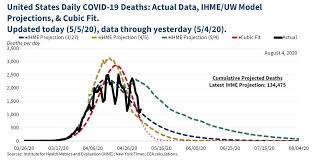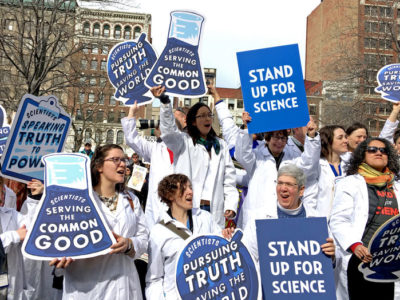Environmental Science
Trees Will *Not* Solve Climate Change
The authors of a controversial, influential paper backtrack — again
Last summer, I pointed to a then-new paper in Science that concluded that planting trees could remove two-thirds of historical anthropogenic carbon dioxide emissions from the atmosphere at very low costs. At the time, I characterized the claims in it and the associated media communications as “misleading, if not false, as well as potentially dangerous.” …
Continue reading “Trees Will *Not* Solve Climate Change”
CONTINUE READINGUsing and Abusing Models: Lessons from COVID-19
We’ve seen some great examples of how NOT to deal with models.
Models have figured heavily in government responses to the coronavirus. This has given us the opportunity for a real-time lesson in the uses of models. In the process, we’ve learned some important lessons in how to best make use of models — and equally importantly, in how not to use them. That’s directly relevant to …
Continue reading “Using and Abusing Models: Lessons from COVID-19”
CONTINUE READINGWhat’s the Matter With Bill de Blasio?
The Progressive-Leaning Democrat has more in common with Donald Trump than you might think.
Willful bungling of the coronavirus crisis cuts across ideologies and political parties. That’s the lesson that we learn from the story of Bill de Blasio. He is very different, across many different dimensions, than Donald Trump. But it turns out that he shares something important with Trump: a tendency to place personality over expertise. De …
Continue reading “What’s the Matter With Bill de Blasio?”
CONTINUE READING100 Law Professors Urge EPA to Withdraw Revamped “Transparency in Science” Rule
EPA’s new proposal would go beyond even the far-reaching original to limit agency use of the best science
Today, on behalf of 100 environmental and administrative law professors affiliated with 70 universities in 33 states and the District of Columbia, Sean Hecht and I filed a comment letter urging EPA to withdraw its updated proposal to limit the use of science in agency decisionmaking processes, misleadingly named the “Strengthening Transparency in Science” rule. …
Continue reading “100 Law Professors Urge EPA to Withdraw Revamped “Transparency in Science” Rule”
CONTINUE READINGWe Need an Environmental Dr. Fauci
Much of environmental law is about protecting public health. But the Trump Administration won’t listen.
During the coronavirus crisis, Dr. Anthony Fauci has become the voice of reason. Much of the public turns to him for critical information about public health, while even Trump finds it necessary to listen. In the Trump era, no one plays that role in the environmental area. The result is a mindless campaign of deregulation …
Continue reading “We Need an Environmental Dr. Fauci”
CONTINUE READINGThe Epstein Affair
A prominent law prof got COVID-19 numbers disastrously wrong. Then things got worse.
The New Yorker recently published a devastating interview with law professor Richard Epstein. He had attracted their notice by publishing two columns on the Hoover Institution website, the first projecting a total of 500 U.S. deaths from the coronavirus (later raised to 5000), and the second defending his work. I don’t see any need to …
Continue reading “The Epstein Affair”
CONTINUE READINGPolticial Bias Versus Scientific Integrity: An Empirical Test
What the effort to pack the EPA’s Scientific Advisory Board can teach us.
Many people distrust environmental science, though for different reasons. Progressives may discount science that they see as supporting business interests. Meanwhile, conservatives may think scientists come to “politically correct” conclusions in order to get grants. It’s reasonable to think that these things may sometimes happen. But how strong are these effects? Unwittingly, the Trump Administration …
Continue reading “Polticial Bias Versus Scientific Integrity: An Empirical Test”
CONTINUE READINGThe Flight From Evidence-Based Regulation
This Administration specializes in arguments for ignoring the evidence.
The Trump Administration’s major deregulatory efforts share a common theme. They assiduously avoid having to rely on scientific or economic evidence. Confronting that evidence is time-consuming and difficult, particularly when it often comes out the other way. Instead, the Administration has come up with clever strategies to shut out the evidence. The effort to repeal …
Continue reading “The Flight From Evidence-Based Regulation”
CONTINUE READINGHow Hot Will Things Get?
Identifying a realistic worst case scenario is complicated.
How hot will the world be in 2100? The answer partly depends on how much carbon we dump in the atmosphere between now and then. It also depends on how sensitive the climate system is to those emissions. Scientists have used 4.5 °C as the high end of the likely possibilities. That estimate derives from …
Continue reading “How Hot Will Things Get?”
CONTINUE READINGTracing Trump’s Trillion Trees
The president’s embrace of massive tree planting has a remarkable — and questionable — backstory
During last week’s State of the Union address, US President Donald Trump said: To protect the environment, days ago I announced that the United States will join the One Trillion Trees Initiative, an ambitious effort to bring together government and private sector to plant new trees in America and all around the world. Astute regular …
Continue reading “Tracing Trump’s Trillion Trees”
CONTINUE READING













